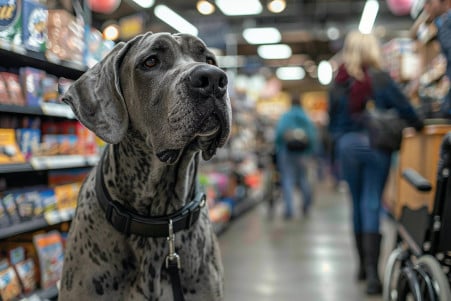IKEA's Dog Policy: Can You Bring Your Pup Shopping?
2 May 2024 • Updated 2 May 2024

If you're hoping to take your dog shopping with you, you may be wondering if IKEA allows dogs in their stores. While the pet policy at IKEA can vary by location, in general, dogs are allowed in the store as long as they are on a leash and well-behaved. However, some areas of the store, such as the restaurant, may have restrictions, so it's best to contact your local store for the most up-to-date information.
This article will explore IKEA's pet policies in different countries and locations to help you better understand when and where you can shop with your dog. Through a combination of customer feedback, media coverage, and IKEA's own information, we'll cover everything you need to know before you head to this popular furniture store with your four-legged friend.
Does IKEA allow dogs in their stores?
Why IKEA's Pet Policy Is More Restrictive in the US and Canada
Despite the fact that IKEA has a more permissive pet policy in other parts of the world, the company has chosen to adopt a more restrictive policy in the United States and Canada. This decision is likely the result of a number of concerns and factors that businesses must weigh when deciding what kind of pet policy to implement.
One of the most important factors is the health and safety of customers, which is a top priority for IKEA, according to the company's US pet policy. Allowing pets in busy retail environments can lead to accidents, allergic reactions, and even aggressive behavior by animals. In addition, there are legal and liability issues to consider, since businesses can be held responsible for incidents involving pets on their property.
Another consideration is the customer experience. While some customers enjoy shopping in pet-friendly stores, others may be bothered by the presence of animals, which they may find unsanitary or disruptive. This could negatively impact their shopping experience. IKEA is likely trying to find a balance that meets the needs of its diverse customer base.
On the other hand, IKEA's more permissive pet policies in places like Mexico and the Dominican Republic may indicate a cultural trend toward greater acceptance of pets in public places. Local laws, cultural norms, and customer expectations may all be factors in the company's decision to allow pets in its stores in these areas.
Both points of view have their merits. Allowing pets in stores can create a welcoming environment for pet owners and encourage responsible pet ownership. However, businesses also have a responsibility to ensure that all of their customers feel safe and comfortable while protecting themselves from potential legal issues. IKEA's policy appears to be a result of a careful balancing of these concerns, tailored to the needs and expectations of each market.
Pet Policies at IKEA Stores Around the World
In contrast to the pet policies in the United States and Canada, IKEA’s policies in many other parts of the world are much more pet-friendly. For example, the pet policy for IKEA stores in Spain, as outlined in the company’s customer service information, states that pets are allowed in all stores except for the IKEA Valls store. However, the policy does specify that pets must be on a short, non-extendable leash that is no longer than 1.5 meters, and dogs that are considered potentially dangerous must be muzzled.
The pet policy in Austria is similar, with dogs allowed in all stores except for the IKEA Innsbruck store, as long as they are on a leash and muzzled, according to IKEA’s customer service information. These policies are likely due to cultural and local differences, including local laws and regulations that are more accepting of pets in public spaces.
However, customers who plan to visit IKEA stores with their pets in these countries should still make sure they understand the specific pet policies, including leash and muzzle requirements and breed restrictions, to ensure that they and their pets have a positive shopping experience and to avoid any potential conflicts with other customers.
Customer Reactions: How IKEA's Pet Policies Have Been Received
IKEA's pet policies have sparked a variety of responses from customers, including pet owners and non-pet owners. While some have commended the company for its efforts to better serve pet owners, others have criticized the more stringent policies in some parts of the world.
As noted in IKEA's announcement of the UTSÅDD pet collection, the company has aimed to "simplify and brighten up life at home with pets" by creating a product line that was developed in collaboration with veterinarians and pet experts. This shows that the company is aware of the demand for pet-friendly retail spaces.
In fact, an Adweek piece points out that IKEA's humorous marketing campaign, which acknowledges the "messy realities of pet ownership" and reassures consumers that their affordable furniture can handle the abuse of pets, shows that the company is aware of the demand for pet-friendly retail spaces.
In addition, there have been heartwarming reports of IKEA stores, like the one in Catania, Italy, welcoming homeless dogs inside to stay warm and dry while customers shop, as covered by The Dog People by Rover.com and TIME. These one-of-a-kind customer interactions have helped create a positive image of IKEA's pet-friendly policies.
On the other hand, the company's more stringent pet policies in the U.S. and Canada, where only service animals are allowed, have been criticized by some customers who would like to see a more inclusive approach. This shows that IKEA is still trying to find the right balance between serving pet owners and making sure all of its customers feel comfortable and safe in its stores.
As IKEA's pet policies continue to change, customer reactions and public opinion will likely continue to influence the company's decisions as it tries to find the right balance between the needs of its diverse customer base.
Legal, Health, and Safety Factors
Companies such as IKEA have to take into account a number of legal, health, and safety factors when determining their pet policy. The ASPCA notes that most retail stores, including grocery stores and restaurants, don’t allow pets inside because of concerns about sanitation and health, even if they allow them in certain outdoor areas.
The Americans with Disabilities Act (ADA) requires that companies allow service animals, which are dogs that are individually trained to do work or perform tasks for people with disabilities. The U.S. Department of Justice explains that emotional support or comfort animals are not considered service animals under the ADA, and companies are not required to allow these animals inside their businesses.
In addition to these legal factors, Chartwell Law points out that companies also need to consider their potential liability. In general, stores are not held liable for injuries caused by animals on their premises unless there is evidence that the store knew the animal was dangerous and didn’t take the necessary steps to protect others from it.
To protect themselves, the U.S. Chamber of Commerce recommends that companies clearly outline their pet policies, anticipate potential conflicts, and secure the appropriate liability coverage. Finding the right way to meet the needs of their customers while keeping everyone safe is a delicate balance for companies like IKEA to strike as they work to meet the demands of a pet-friendly policy.
How IKEA's Pet Policy Compares to Other Major Retailers
IKEA's policy of only allowing service animals in its U.S. and Canada stores is much more restrictive than the policies of many other major retailers. According to Rover.com, Petco, Tractor Supply Co, Nordstrom, and Lush Cosmetics are among the stores that allow dogs in all or most of their locations, while Home Depot, Lowe's, and TJ Maxx/Marshalls/Homesense allow dogs in some of their stores.
Meanwhile, the Texas Humane Network lists Lowe's, Petsmart, Hobby Lobby, Petco, Ace Hardware, and Nordstrom as some of the most pet-friendly major retailers, with policies that range from allowing leashed dogs to having designated pet areas. In contrast, IKEA's policy of only allowing service animals is more in line with the policies of Target, Costco, Walmart, and Whole Foods.
These differences in pet policies may be due to a variety of factors, including industry standards, the demographics of the stores' customer bases, and legal and safety concerns. Golden Retriever Life observes that stores that cater to outdoor enthusiasts, such as Bass Pro Shops, are more likely to be pet-friendly.
IKEA's policy of only allowing service animals could affect customer loyalty and satisfaction, especially among pet owners, when compared to its competitors with more pet-friendly policies. However, as Offers.com notes, IKEA's emphasis on safety and liability may be in line with the rest of the industry, even if it doesn't keep up with the increasing demand for pet-friendly shopping environments.
Conclusion: Understanding IKEA's Pet Policies
IKEA's pet policies are quite different in Europe and the United States and Canada. In Europe, the company is much more lenient, allowing pets as long as they are leashed or in a carrier. However, in the United States and Canada, IKEA only allows service animals in its stores, as required by law.
The reasons for this difference include concerns about health and safety, legal requirements, and the need to ensure a positive shopping experience for all customers. In particular, IKEA wants to make sure that customers with allergies or other sensitivities to pets can shop in a clean and comfortable environment. At the same time, it wants to accommodate pet owners as much as possible.
Even within Europe, there are differences in how pet-friendly IKEA stores are. For example, in Spain and Austria, pets are allowed with restrictions on leash length, breed, and cleanliness. These differences are likely due to a combination of cultural norms, local laws, and customer demand.
If you're thinking of bringing your pet to IKEA, it's important to check the pet policy at your local store. Some stores are more pet-friendly than others, but even in Europe, the company's policies are more restrictive than they once were.


